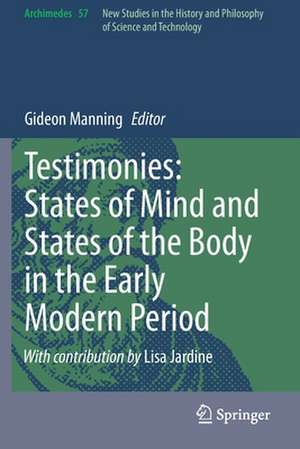Testimonies: States of Mind and States of the Body in the Early Modern Period: Archimedes, cartea 57
Editat de Gideon Manningen Limba Engleză Paperback – 7 apr 2021
| Toate formatele și edițiile | Preț | Express |
|---|---|---|
| Paperback (1) | 777.20 lei 43-57 zile | |
| Springer International Publishing – 7 apr 2021 | 777.20 lei 43-57 zile | |
| Hardback (1) | 783.20 lei 43-57 zile | |
| Springer International Publishing – 7 apr 2020 | 783.20 lei 43-57 zile |
Din seria Archimedes
- 5%
 Preț: 909.01 lei
Preț: 909.01 lei - 18%
 Preț: 899.21 lei
Preț: 899.21 lei - 18%
 Preț: 785.55 lei
Preț: 785.55 lei -
 Preț: 382.36 lei
Preț: 382.36 lei - 18%
 Preț: 1833.33 lei
Preț: 1833.33 lei - 15%
 Preț: 643.84 lei
Preț: 643.84 lei - 18%
 Preț: 951.77 lei
Preț: 951.77 lei - 15%
 Preț: 645.79 lei
Preț: 645.79 lei - 15%
 Preț: 644.30 lei
Preț: 644.30 lei - 20%
 Preț: 577.17 lei
Preț: 577.17 lei - 18%
 Preț: 1108.04 lei
Preț: 1108.04 lei - 15%
 Preț: 646.62 lei
Preț: 646.62 lei - 18%
 Preț: 1110.09 lei
Preț: 1110.09 lei - 18%
 Preț: 1216.65 lei
Preț: 1216.65 lei - 18%
 Preț: 730.02 lei
Preț: 730.02 lei - 18%
 Preț: 1552.22 lei
Preț: 1552.22 lei - 18%
 Preț: 891.48 lei
Preț: 891.48 lei - 18%
 Preț: 776.88 lei
Preț: 776.88 lei - 18%
 Preț: 1214.60 lei
Preț: 1214.60 lei - 18%
 Preț: 1113.26 lei
Preț: 1113.26 lei - 18%
 Preț: 777.69 lei
Preț: 777.69 lei - 18%
 Preț: 995.83 lei
Preț: 995.83 lei - 15%
 Preț: 635.47 lei
Preț: 635.47 lei - 24%
 Preț: 1459.25 lei
Preț: 1459.25 lei - 18%
 Preț: 948.47 lei
Preț: 948.47 lei - 18%
 Preț: 1666.97 lei
Preț: 1666.97 lei - 18%
 Preț: 1114.83 lei
Preț: 1114.83 lei - 15%
 Preț: 645.60 lei
Preț: 645.60 lei
Preț: 777.20 lei
Preț vechi: 947.80 lei
-18% Nou
Puncte Express: 1166
Preț estimativ în valută:
148.76€ • 153.30$ • 125.59£
148.76€ • 153.30$ • 125.59£
Carte tipărită la comandă
Livrare economică 03-17 martie
Preluare comenzi: 021 569.72.76
Specificații
ISBN-13: 9783030393779
ISBN-10: 3030393771
Ilustrații: XIII, 197 p.
Dimensiuni: 155 x 235 mm
Greutate: 0.3 kg
Ediția:1st ed. 2020
Editura: Springer International Publishing
Colecția Springer
Seria Archimedes
Locul publicării:Cham, Switzerland
ISBN-10: 3030393771
Ilustrații: XIII, 197 p.
Dimensiuni: 155 x 235 mm
Greutate: 0.3 kg
Ediția:1st ed. 2020
Editura: Springer International Publishing
Colecția Springer
Seria Archimedes
Locul publicării:Cham, Switzerland
Cuprins
Chapter 1 Editor’s Introduction.- Chapter 2 Lisa Jardine: A Life in the Margins.- Chapter 3 Dosing the Ailing Subject: Reconnecting Early Modern Health and Thought.- Chapter 4 Francis Bacon’s Body and his Experiments on the Prolongation of Life.- Chapter 5 Material Thoughts: Robert Hooke’s Theory of Memory.- Chapter 6 Making Sense of Pain: Valentine Greatrakes, Henry Stubbe and Anne Conway.- Chapter 7 Animal Bodies and Human Minds: The Anatomy of the Brain and the Analogy of Nature.- Chapter 8 Lockean Self-Diagnosis.- Chapter 9 Joseph Glanvill on Imagination, Method and the Art of Thinking.- Chapter 10 Treating Yourself: Self-Diagnosis Amongst Natural Philosophers and Physicians and the Early Medical Case Study.
Notă biografică
Gideon Manning is Research Associate Professor at Claremont Graduate University, having previously taught at the University of Pittsburgh and served on the faculties of the College of William and Mary and the California Institute of Technology. His recent publications include “Health in the Early Modern Philosophical Tradition” (2018), and “Descartes and Medicine” (2019), and he is one of the editors of Professors, Physicians, and Practices in the History of Medicine: Essays in Honor of Nancy Siraisi (2017). At present, he is engaged in a number of projects trying to productively bring together the history of medicine, science and philosophy.
Textul de pe ultima copertă
This book reconnects health and thought, as the two were treated together in the seventeenth century, and by reuniting them, it adds a significant dimension to our historical understanding. Indeed, there is hardly a single early modern figure who took a serious interest in one but not the other, with their attitudes toward body-mind interaction often revealed in acts of self-diagnosis and experimentation. The essays collected here specifically reveal the way experiment and especially self-experiment, combined with careful attention to the states of mind which accompany states of body, provide a new means of assessing attitudes to body-mind interactions just as they show the abiding interest and relevance of source material typically ignored by historians of science and historians of philosophy. In the surviving records of such experimenting on one’s own body, we can observe leading figures like Francis Bacon, Robert Boyle and Robert Hooke, deliberately setting out to repeat pleasurable, or intellectually productive moods and states of mind, by applying the same medicine on successive occasions. In this way we can witness theories of the working of the human mind being developed by key members of an urban culture (London; interregnum Oxford) who based those theories in part on their own regular, long-term use of self-administered, mind-altering substances. It is hardly an overstatement to claim that there was a significant drug culture in the early modern period linked to self-experimentation, new medicines, and the new science. This is one of the many things this volume has to teach us.
Caracteristici
Innovatively connects medicine and science in the seventeenth century Demonstrates how mind-body interaction was put into practice Offers a fresh perspective on the culture of self-experimentation in early modern England
